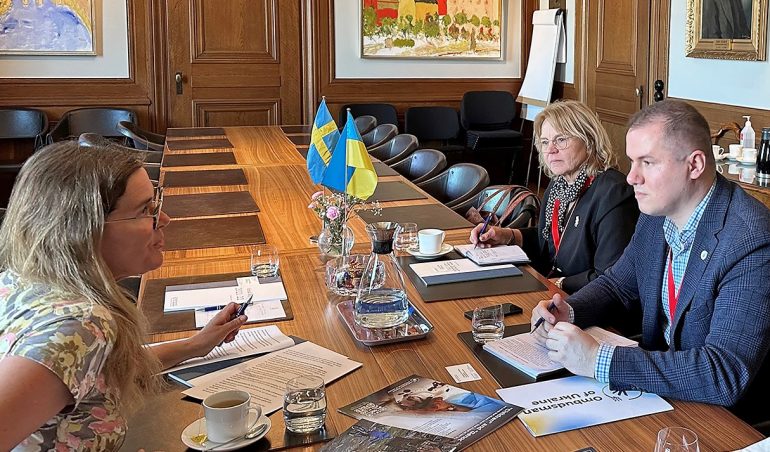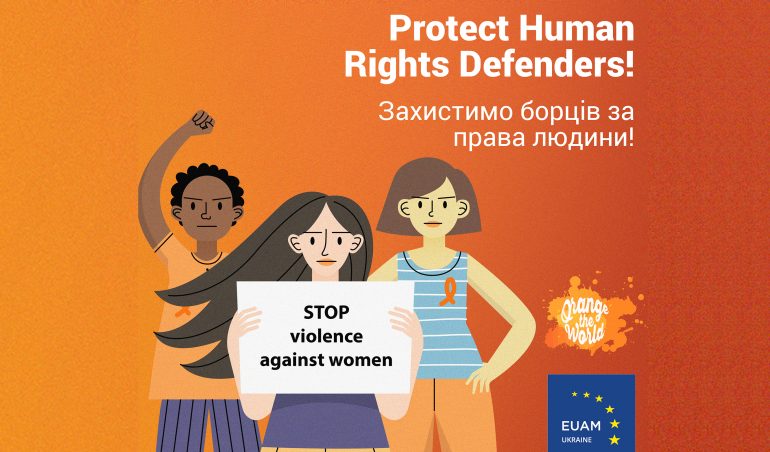Ukraine’s human rights strategy: will it bring real change?
April 21, 2021
EUAM’s Senior Human Rights and Minorities Advisor, Anna Lazzari from Italy, answers a few questions on the strength of Ukraine’s latest human-rights strategy, and what it might mean for citizens.
When was Ukraine’s latest HR strategy approved and what is its significance?
The latest National Human Rights Strategy (NHRS) was approved by the President of Ukraine on 24 March 2021. It addresses the essential human rights issues in Ukraine, and commits the Ukrainian authorities to solve these issues. It will be implemented in accordance with international standards and in the context of Ukraine’s Association Agreement with the EU. The NHRS is a legally binding document for all of the state administration. EUAM Ukraine is going to pay special attention to the implementation, especially with regards to law enforcement agencies and the Prosecution Service in 2021 – 2023.
Who within the Ukrainian state infrastructure is responsible for ownership and implementation of the strategy?
The responsible body is the Cabinet of Ministers of Ukraine. An Action Plan for the implementation of the NHRS with clear responsibilities will follow in the near future. International organisations will also support the implementation. There will be a clear follow-up of the results, as the Ministry of Justice will collect the information on implementation and report to the Cabinet of Ministers and to the President of Ukraine every six months.
How will the general public notice the strategy being implemented? What difference will it make to their lives?
Human rights is an area that touches upon the lives of everybody in Ukraine. Implementation of and compliance with international standards in this field makes societies more democratic, equal, transparent, fair and peaceful. However, major visible changes take time. The NHRS spells out concrete strategic objectives and indicators with foundation of policies, road maps, tangible action plans, changes to the legislation and concrete specific actions by responsible state institutions.
For instance, amendments to the legislation on prohibition of torture and ill-treatment, protection of personal data, procedures on proper investigation activities, evidence collection and practical steps in establishment of Custody Records system in the custody facilities provide concrete protection to the detainees. Ensuring that the work of dialogue policing units in the framework of public order teams during peaceful assemblies protect the rights of the people. We are happy to see concrete real steps and we are optimistic on the implementation of them in the not-so-distant future.
Haven’t we been here before? Wasn’t there a HR strategy/action plan five years ago, and what happened to that? How is this different?
That is correct. This is not the first strategy. EUAM Ukraine supported the process of the previous strategies as well, since 2015. The new strategy is a positive continuation of a longer term process, but this time it is even more comprehensive and inclusive. We are especially happy to see even clearer indicators, and a strong follow-up and assessment system. Execution and achieving results is what it is about and now there is stronger basis for it than before.
In terms of content, the new NHRS reflects better the needs of society, namely addressing issues such as discrimination, gender equality, ways of preventing and combating hate crime, domestic violence, solving challenges that emerge for internally displaced persons and national minorities.
Can you detail please the precise EUAM role in the HR strategy, and how will that evolve going forward?
EUAM was advising throughout the process of drafting the newly adopted NHRS by commenting on the areas that are in the EUAM mandate, namely, right to life, prohibition of torture, ill-treatment, inhumane and degrading treatment, fair trial, rule of law, freedom of peaceful assembly, prohibition of discrimination and gender issues, among others.
We have ensured with our strategic advice that the NHRS is in line with international standards and best European practices. We also advised on the indicators and criteria for the evaluation of NHRS implementation. At the moment we are supporting drafting the Action Plan for NHRS implementation. In the near future we will support law enforcement agencies and Prosecutor in the implementation of the obligations of the strategy. We do this though strategic advice, but also with practical support through multiple projects, in close cooperation with the European and international community.
Do you think this strategy is a good product?
Yes. Even if multiple challenges exist and despite COVID-19, difficult economic situation and ongoing conflict in the east of Ukraine, we are happy with the NHRS. It is a good basis to start delivering and implementing actions that will increase the human rights situation in Ukraine. Of course the strategy will be updated one day and there is always room for improvement, but now the thoughts must focus to the implementation of the one we have now.
How will you evaluate the implementation of the new strategy in future?
There is a set of indicators under each of the 27 priority areas, which makes the document’s implementation measurable. The NHRS implementation evaluation will be done by the state, civil society and international organisations. Every six months we will have a chance officially to address our possible concerns and give our advice in a formal way. This seems to be a very transparent and effective system.
What concerns do you have over its implementation?
NHRS is an ambitious document. At the end of the day, all responsible actors must have both the resources and the will to implement it. We will follow this closely in the civilian security sector, including law enforcement agencies, and alert the relevant authorities if some gaps become apparent.
How would you persuade sceptical members of the general public in Ukraine who believe such strategies have more to do with politics and window dressing, and will not change their everyday lives?
All major changes need a political commitment, vision and guidance. Now we have it with the NHRS. We even have responsible bodies and concrete steps to be taken. The first step is there. Of course, without implementation, NHSR may become just a piece of paper.
But there is a good reason to be optimistic, for two reasons. Firstly, the NHRS is substance-wise good. It has powerful tools to follow up on and measure the implementation. Secondly, a lot is already happening. While the strategy was developed, we have had the chance to communicate and cooperate with several law enforcement agencies, ministries and the parliamentary committees on legislative issues, operational concepts and some technical details, including for example the Custody Record System. Many of the activities that are planned in NHRS are already in the pipeline.
The top level commitment is there. Now we have a chance to make it happen. When sceptics see results they believe. Together we can improve human rights for people in Ukraine and bring the country closer to Europe.





